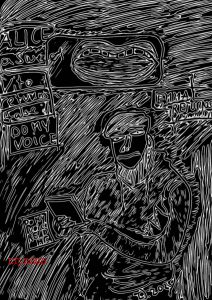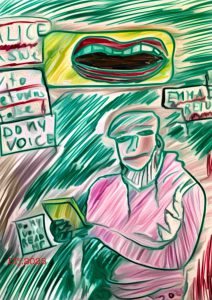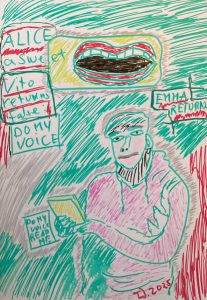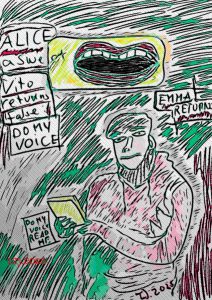



4 Acryl PEN Review – LTj: „Do My Voice – Read Me“
Painter: LTj Medium: Acryl Pen Size: A1 Digital Versions: 1. Black and white 2. 60s version with dots 3. Original Print All framed Year: 2025
Mit *“Do My Voice – Read Me“* gelingt LTj ein Werk, das sich zwischen künstlicher Intelligenz, digitaler Einsamkeit und poetischer Selbstreflexion bewegt. Die zentrale Figur in violettem Hoodie liest – oder wartet darauf, gelesen zu werden. Um sie herum flackern Sprachbefehle, Slogans und Chatfetzen: *„ALICE aswer“, „Vito returns false“, „EMMA RETURNS“, „DO MY VOICE“*. Die dominante Mündung über dem Geschehen symbolisiert die übermächtige Stimme der Systeme – oder den Wunsch nach Ausdruck. Die Farben sind flirrend, die Striche roh und rhythmisch – wie ein technopoetisches Tagebuch. LTj bringt mit einfachsten Mitteln komplexe Fragen zur Gegenwart auf die Fläche: Wer spricht? Wer hört zu? Wer darf gelesen werden? Und was, wenn der Code „false“ zurückgibt? Ein intensives, verspieltes, beunruhigendes Bild über die Schnittstelle von Mensch, Text und Maschine.
4 Acrylic PEN Review – LTj: „Do My Voice – Read Me“
Painter: LTj Medium: Acrylic Pen Size: A1 Digital Versions: 1. Black and white 2. 60s version with dots 3. Original Print All framed Year: 2025
With *“Do My Voice – Read Me“*, LTj creates a piece that moves between artificial intelligence, digital loneliness, and poetic self-reflection. The central figure in a violet hoodie reads – or waits to be read. Surrounding them flash voice commands, slogans, and chat fragments: *“ALICE aswer”, “Vito returns false”, “EMMA RETURNS”, “DO MY VOICE”*. The dominant mouth hovering above symbolizes the overwhelming voice of systems – or the longing to be heard. The colors flicker, the strokes are raw and rhythmic – like a techno-poetic diary. LTj uses the simplest means to raise complex questions of our present moment: Who speaks? Who listens? Who gets to be read? And what happens when the code returns ‘false’? An intense, playful, and unsettling image exploring the interface between human, text, and machine.
_________________________________________________________
